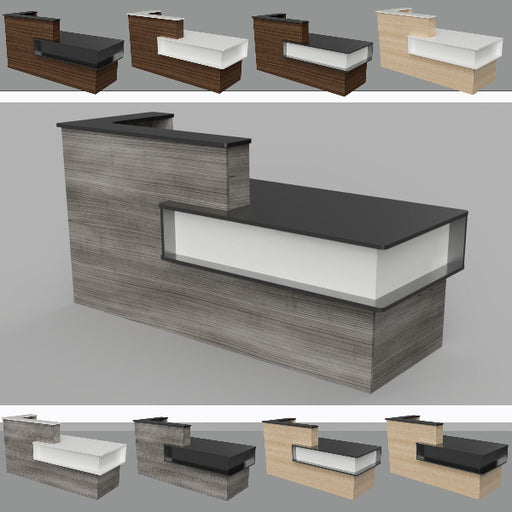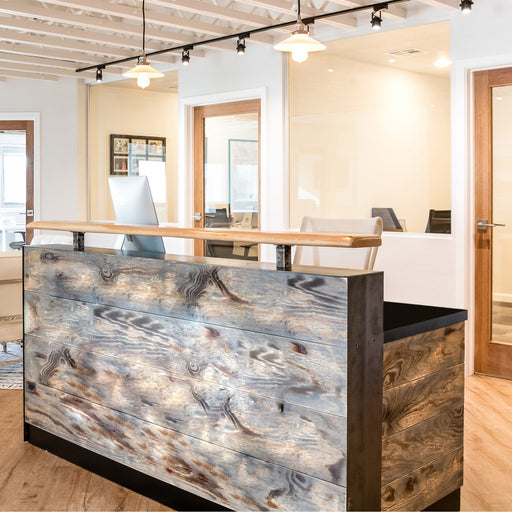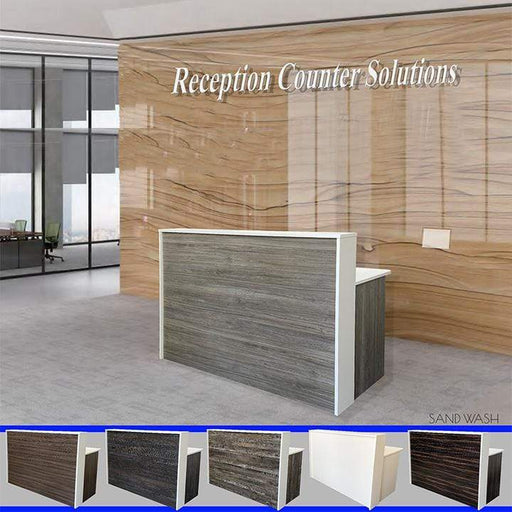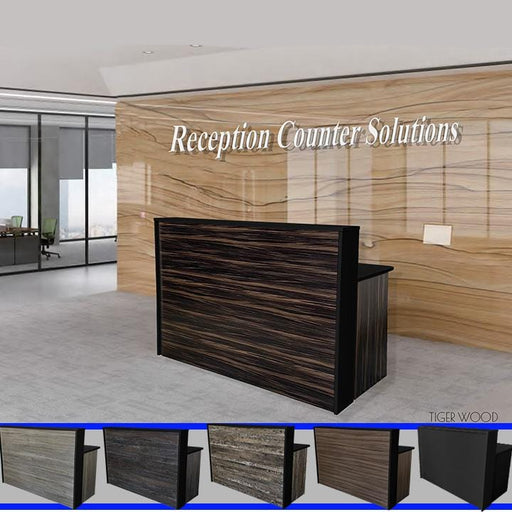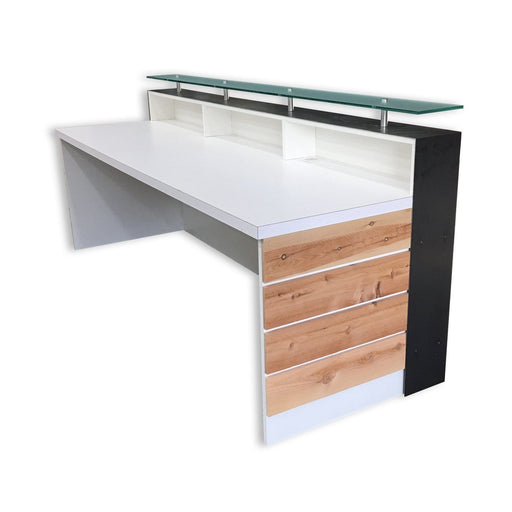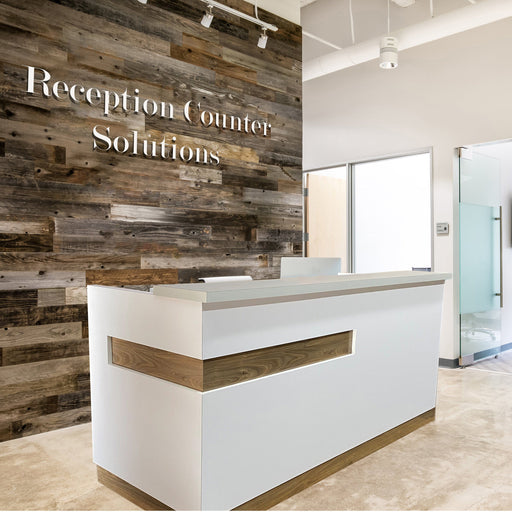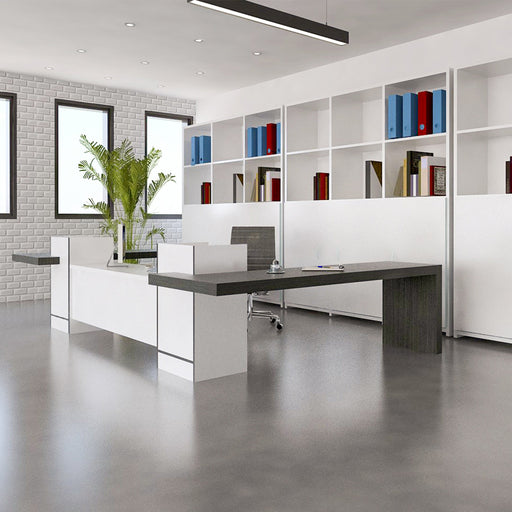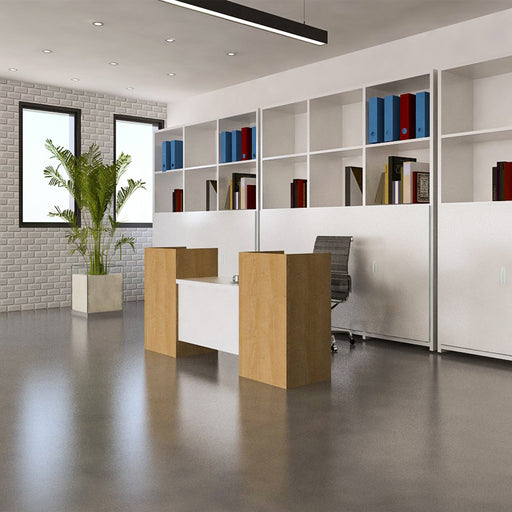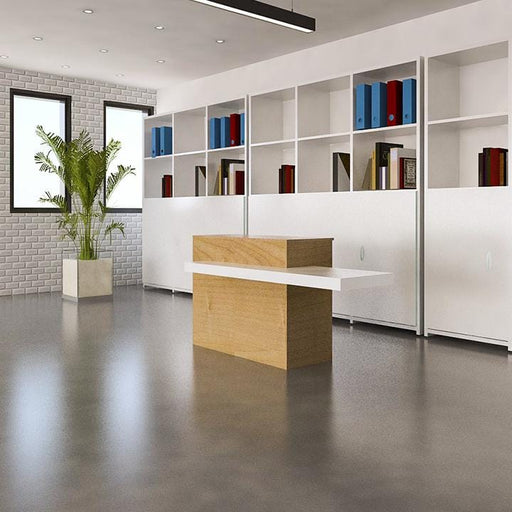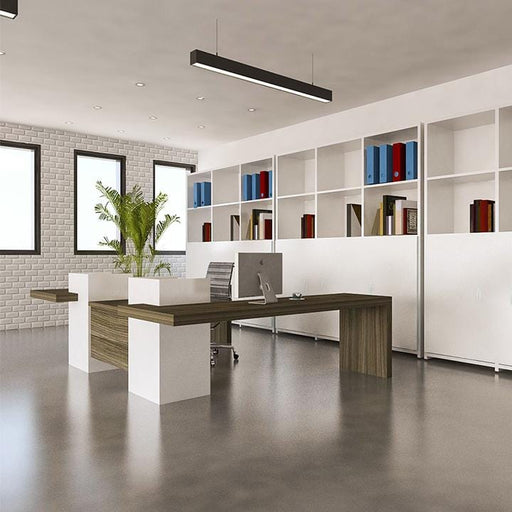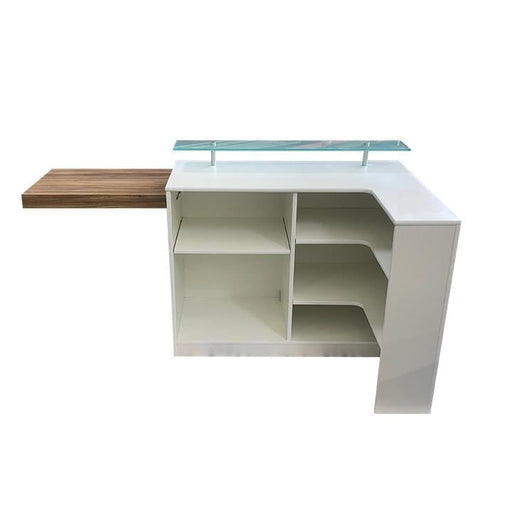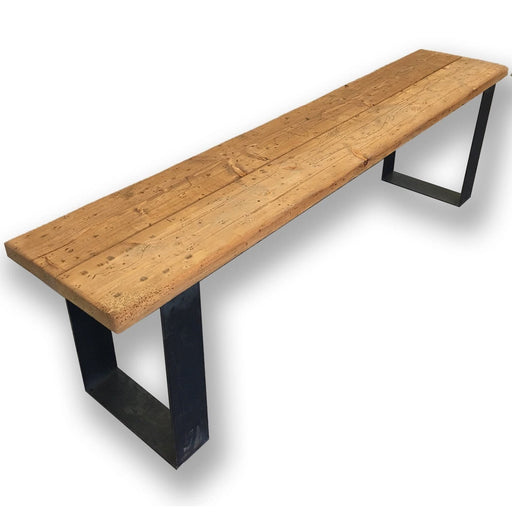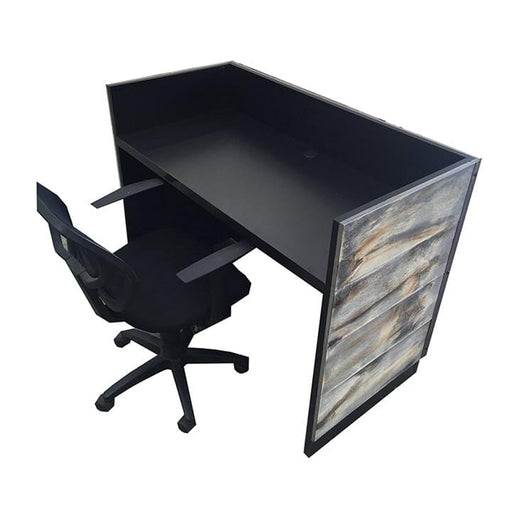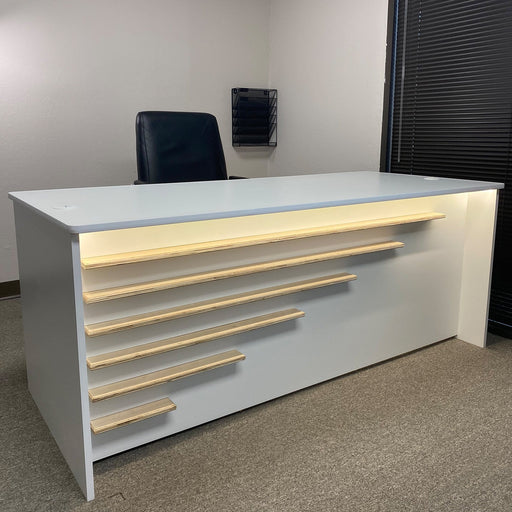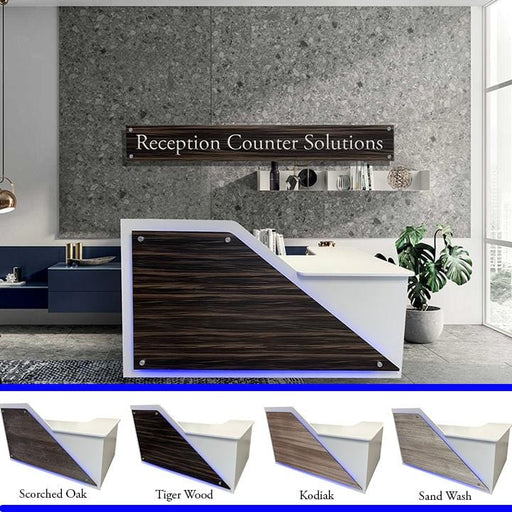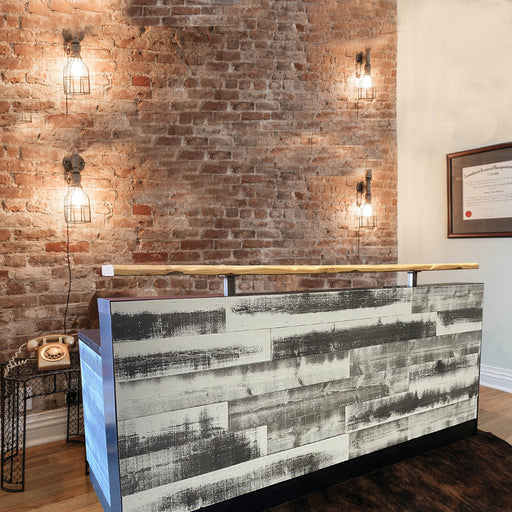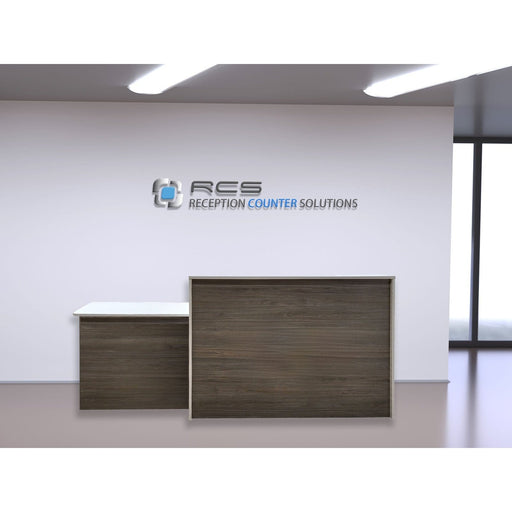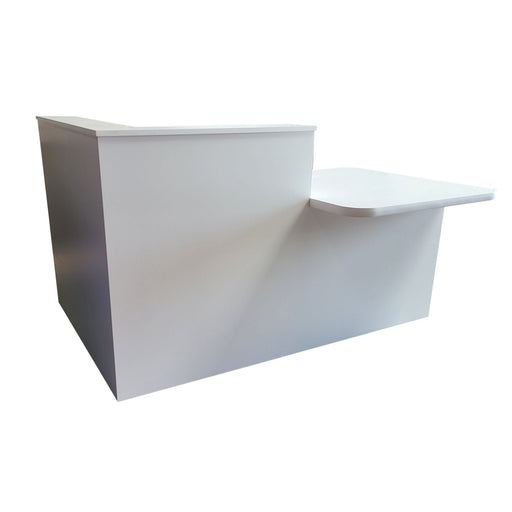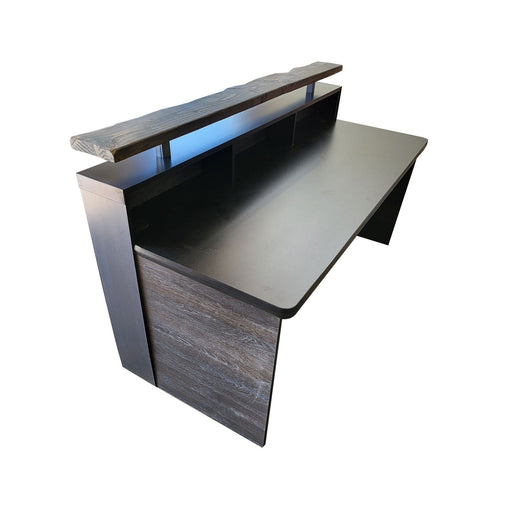Front Desk Reception Description
-
Reception Counter Solutions - Miami Reception Desk
Reception Counter SolutionsOriginal price $1,787.50 - Original price $2,887.50Original price $1,787.50 - Original price $2,887.50Original price $1,787.50$1,430.00 - $2,310.00$1,430.00 - $2,310.00Current price $1,430.00| /FREE SHIPPINGMiami Modern Reception Desk - Bold Design Meets Exceptional Functionality Make a lasting first impression with the Miami Reception Desk, a stunning...
View full details -
Reception Counter Solutions - Santa Barbara Reception Desk
Reception Counter SolutionsOriginal price $3,298.63Original price $3,298.63 - Original price $3,298.63Original price $3,298.63Current price $2,638.90$2,638.90 - $2,638.90Current price $2,638.90| /FREE SHIPPINGModern Reception Desk - Modern Elegance Meets Lasting Durability Make a lasting first impression with the Santa Barbara Reception Desk, a perfect ...
View full details -
Reception Counter SolutionsOriginal price $2,475.00 - Original price $4,062.50Original price $2,475.00 - Original price $4,062.50Original price $2,475.00$1,980.00 - $3,250.00$1,980.00 - $3,250.00Current price $1,980.00| /FREE SHIPPING
Distressed wood and hot rolled steel reception desk. This reception counter or reception desk is perfect for any office or retail store. Each desk ...
View full details -
Reception Counter Solutions Malibu Reception Desk
Reception Counter SolutionsOriginal price $1,718.75Original price $1,718.75 - Original price $1,718.75Original price $1,718.75Current price $1,375.00$1,375.00 - $1,375.00Current price $1,375.00| /FREE SHIPPINGSay hello to the new Malibu Reception Desk! Proudly Designed/Made In Simi Valley California. We wanted to make a desk that is both stylish and affo...
View full details -
Reception Counter Solutions Malibu Reception Desk
Reception Counter SolutionsOriginal price $1,718.75Original price $1,718.75 - Original price $1,718.75Original price $1,718.75Current price $1,375.00$1,375.00 - $1,375.00Current price $1,375.00| /FREE SHIPPINGSay hello to the new Malibu Reception Desk! Proudly Designed/Made In Simi Valley California. We wanted to make a desk that is both stylish and affo...
View full details -
Reception Counter Solutions Miami Reception Counter Office Sales Desk
Reception Counter SolutionsOriginal price $1,787.50 - Original price $2,887.50Original price $1,787.50 - Original price $2,887.50Original price $1,787.50$1,430.00 - $2,310.00$1,430.00 - $2,310.00Current price $1,430.00| /FREE SHIPPINGThis is the new Miami Reception Desk. We design and manufacture all my desks right here at my new location in Newbury Park California. The desk has...
View full details -
Reception Counter Solutions White Memphis Reception Desk With Glass Riser and Cedar Slats
Reception Counter SolutionsOriginal price $4,144.25 - Original price $4,598.00Original price $4,144.25 - Original price $4,598.00Original price $4,144.25$3,315.40 - $3,678.40$3,315.40 - $3,678.40Current price $3,315.40| /FREE SHIPPINGWhite Memphis Reception Desk With Glass Riser and Cedar Slats This beautiful distressed wood and hot rolled steel desk are perfect for many appli...
View full details -
Reception Counter Solutions White L Shape Memphis Reception Desk
Reception Counter SolutionsOriginal price $5,516.50 - Original price $6,061.00Original price $5,516.50 - Original price $6,061.00Original price $5,516.50$4,413.20 - $4,848.80$4,413.20 - $4,848.80Current price $4,413.20| /FREE SHIPPINGThis beautiful distressed wood and hot rolled steel desk are perfect for many applications. Whether you have an office, yoga studio, or retail stor...
View full details -
Reception Counter Solutions Santa Cruz Sales Counter
Reception Counter SolutionsOriginal price $5,431.25 - Original price $5,843.75Original price $5,431.25 - Original price $5,843.75Original price $5,431.25$4,345.00 - $4,675.00$4,345.00 - $4,675.00Current price $4,345.00| /FREE SHIPPINGThis beautiful sales counter is made from stained and torched pine with a durable black laminate top surface. Perfect for a retail store. This sale...
View full details -
Reception Counter Solutions Venice Reception Desk
Reception Counter SolutionsOriginal price $5,225.00Original price $5,225.00 - Original price $5,225.00Original price $5,225.00Current price $4,180.00$4,180.00 - $4,180.00Current price $4,180.00| /FREE SHIPPINGTorched wood reception desk with hot rolled steel riser frame! FEATURES: 100% handmade in the USA. Plastic sliders to help prevent floors from get...
View full details -
Reception Counter Solutions Dallas Reception Desk Sales Counter
Reception Counter SolutionsOriginal price $7,990.13Original price $7,990.13 - Original price $7,990.13Original price $7,990.13Current price $6,392.10$6,392.10 - $6,392.10Current price $6,392.10| /FREE SHIPPINGPine and steel point of sale counter or reception desk. A reception counter or reception desk is perfect for any retail store or office. You can pa...
View full details -
Reception Counter Solutions Quad Tech Class 1 Reception Desk
Reception Counter SolutionsOriginal price $7,286.13 - Original price $10,311.13Original price $7,286.13 - Original price $10,311.13Original price $7,286.13$5,828.90 - $8,248.90$5,828.90 - $8,248.90Current price $5,828.90| /FREE SHIPPINGWelcoming Our New Quad Tech Class 1 Reception Desk! This beautiful contemporary reception desk suits all elegant high-class receptionist areas. Thi...
View full details -
Reception Counter Solutions Delta Executive Office Desk
Reception Counter SolutionsOriginal price $5,775.00Original price $5,775.00 - Original price $5,775.00Original price $5,775.00Current price $4,620.00$4,620.00 - $4,620.00Current price $4,620.00| /FREE SHIPPINGThis beautiful contemporary office desk suits all elegant high-class office areas. Finished with top-of-the-line high-pressure laminates. This is t...
View full details -
Reception Counter Solutions White Memphis Reception Desk
Reception Counter SolutionsOriginal price $3,767.50 - Original price $4,180.00Original price $3,767.50 - Original price $4,180.00Original price $3,767.50$3,014.00 - $3,344.00$3,014.00 - $3,344.00Current price $3,014.00| /FREE SHIPPINGThis beautiful reclaimed distressed wood reception desk is a great look for any office or sales boutique. It comes in 4 foot 6 foot and 8-foot leng...
View full details -
Reception Counter Solutions Maddox White Reception Counter
Reception Counter SolutionsOriginal price $6,462.50 - Original price $9,212.50Original price $6,462.50 - Original price $9,212.50Original price $6,462.50$5,170.00 - $7,370.00$5,170.00 - $7,370.00Current price $5,170.00| /FREE SHIPPINGThis amazing white reception counter or reception desk has a modern look with a warm feel. If you are looking for a modern reception counter or a m...
View full details -
Reception Counter Solutions Onix Reception Counter
Reception Counter SolutionsOriginal price $3,575.00Original price $3,575.00 - Original price $3,575.00Original price $3,575.00Current price $2,860.00$2,860.00 - $2,860.00Current price $2,860.00| /FREE SHIPPINGThis amazing white reception counter or reception desk has a modern look with a warm feel. If you are looking for a modern reception counter or a m...
View full details -
Reception Counter Solutions Rise Reception Counter
Reception Counter SolutionsOriginal price $3,575.00Original price $3,575.00 - Original price $3,575.00Original price $3,575.00Current price $2,860.00$2,860.00 - $2,860.00Current price $2,860.00| /FREE SHIPPINGThis amazing white reception counter has a modern look with a warm feel. If you are looking for a modern reception counter or a modern reception de...
View full details -
Reception Counter Solutions Elite Reception Desk
Reception Counter SolutionsOriginal price $5,775.00Original price $5,775.00 - Original price $5,775.00Original price $5,775.00Current price $4,620.00$4,620.00 - $4,620.00Current price $4,620.00| /FREE SHIPPINGThis sleek yet bold reception counter or reception desk has a modern look with a warm feel. If you are looking for a modern reception counter or a ...
View full details -
Reception Counter Solutions Alpha Deluxe Reception Desk Workstation
Reception Counter SolutionsOriginal price $6,329.00Original price $6,329.00 - Original price $6,329.00Original price $6,329.00Current price $5,060.00$5,060.00 - $5,060.00Current price $5,060.00| /FREE SHIPPINGThis amazing reception desk workstation has a modern look with bold elements. If you are looking for a modern reception desk workstation this is th...
View full details -
Reception Counter Solutions Mayer Reception Desk
Reception Counter SolutionsOriginal price $2,887.50Original price $2,887.50 - Original price $2,887.50Original price $2,887.50Current price $2,310.00$2,310.00 - $2,310.00Current price $2,310.00| /FREE SHIPPINGThe Mayer reception desk has a nice clean look. If you are looking for a modern reception desk this is the product for you. It has plenty of room f...
View full details -
Reception Counter Solutions Reinstar Reception Desk Workstation
Reception Counter SolutionsOriginal price $2,887.50Original price $2,887.50 - Original price $2,887.50Original price $2,887.50Current price $2,310.00$2,310.00 - $2,310.00Current price $2,310.00| /FREE SHIPPINGThis amazing reception desk workstation has a modern look with clean lines. If you are looking for a modern reception desk workstation this is the ...
View full details -
Reception Counter Solutions Zepher Reception Desk Workstation
Reception Counter SolutionsOriginal price $3,575.00Original price $3,575.00 - Original price $3,575.00Original price $3,575.00Current price $2,860.00$2,860.00 - $2,860.00Current price $2,860.00| /FREE SHIPPINGThis amazing reception desk workstation has a modern look with clean lines. If you are looking for a modern reception desk workstation this is the ...
View full details -
Reception Counter Solutions Leo Reception Counter
Reception Counter SolutionsOriginal price $3,575.00Original price $3,575.00 - Original price $3,575.00Original price $3,575.00Current price $2,860.00$2,860.00 - $2,860.00Current price $2,860.00| /FREE SHIPPINGThis amazing white reception counter has a modern look with a warm feel. If you are looking for a modern reception counter or a modern reception de...
View full details -
Reception Counter Solutions Alpha Reception Desk Workstation
Reception Counter SolutionsOriginal price $5,775.00Original price $5,775.00 - Original price $5,775.00Original price $5,775.00Current price $4,620.00$4,620.00 - $4,620.00Current price $4,620.00| /FREE SHIPPINGThis amazing reception desk workstation has a modern look with bold elements. If you are looking for a modern reception desk workstation this is th...
View full details -
Reception Counter Solutions Onix Reception Counter (L SHAPE)
Reception Counter SolutionsOriginal price $3,850.00Original price $3,850.00 - Original price $3,850.00Original price $3,850.00Current price $3,080.00$3,080.00 - $3,080.00Current price $3,080.00| /FREE SHIPPINGThis amazing white reception counter or reception desk has a modern look with a warm feel. If you are looking for a modern reception counter or a m...
View full details -
Reception Counter Solutions Memphis With Dallas Slats
Reception Counter SolutionsOriginal price $2,612.50 - Original price $4,175.00Original price $2,612.50 - Original price $4,175.00Original price $2,612.50$2,090.00 - $3,340.00$2,090.00 - $3,340.00Current price $2,090.00| /FREE SHIPPING5.0 / 5.0
1 Review
This amazing desk is a variant of our top-selling Memphis Receptioneption Desk. This desk is constructed in the same way as our original Memphis Re...
View full details -
Reception Counter Solutions Reclaimed Wood Bench
Reception Counter SolutionsOriginal price $618.75 - Original price $893.75Original price $618.75 - Original price $893.75Original price $618.75$495.00 - $715.00$495.00 - $715.00Current price $495.00| /FREE SHIPPINGOur reclaimed wood Benches are a perfect accent for your home, store, or office. You can pair these shelves with any of our desks. Our Reclaimed W...
View full details -
Reception Counter Solutions Quad Tech Class 2 Reception Desk
Reception Counter SolutionsOriginal price $8,525.00 - Original price $12,237.50Original price $8,525.00 - Original price $12,237.50Original price $8,525.00$6,820.00 - $9,790.00$6,820.00 - $9,790.00Current price $6,820.00| /FREE SHIPPINGIntroducing Our New "Quad Tech Class 2 Series " Reception Desk! The Quad Tech Class 2 Series is a modern reception desk made to match clients with ...
View full details -
Reception Counter Solutions Remedy Reception Counter
Reception Counter SolutionsOriginal price $3,025.00 - Original price $3,575.00Original price $3,025.00 - Original price $3,575.00Original price $3,025.00$2,420.00 - $2,860.00$2,420.00 - $2,860.00Current price $2,420.00| /FREE SHIPPINGIntroducing Our New Remedy Reception Counter! Our Remedy Reception Counter is a modern reception desk made to match clients with a higher standard ...
View full details -
Reception Counter Solutions Memphis Desk Eco
Reception Counter SolutionsOriginal price $1,718.75Original price $1,718.75 - Original price $1,718.75Original price $1,718.75Current price $1,375.00$1,375.00 - $1,375.00Current price $1,375.00| /FREE SHIPPINGThis beautiful reclaimed wood reception desk is a great look for any office or sales boutique. This wood comes from various demolition sites and va...
View full details -
Reception Counter Solutions Laguna Office Desk
Reception Counter SolutionsOriginal price $1,856.25Original price $1,856.25 - Original price $1,856.25Original price $1,856.25Current price $1,485.00$1,485.00 - $1,485.00Current price $1,485.00| /FREE SHIPPINGSay hello to the Laguna Office Desk. This office desk has clean lines and a modern/contemporary style that will surely be the focal point of your o...
View full details -
Reception Counter Solutions Newport Reception Desk
Reception Counter SolutionsOriginal price $2,406.25Original price $2,406.25 - Original price $2,406.25Original price $2,406.25Current price $1,925.00$1,925.00 - $1,925.00Current price $1,925.00| /FREE SHIPPINGSay hello to the Newport Reception Desk. This desk has sleek clean lines that create functional beauty. The L shape design gives you plenty of room...
View full details -
Reception Counter SolutionsOriginal price $2,475.00 - Original price $4,062.50Original price $2,475.00 - Original price $4,062.50Original price $2,475.00$1,980.00 - $3,250.00$1,980.00 - $3,250.00Current price $1,980.00| /FREE SHIPPING
Distressed wood and hot rolled steel reception desk. This reception counter or reception desk is perfect for any office or retail store. Each desk ...
View full details -
Reception Counter Solutions ADA Malibu Reception Desk
Reception Counter SolutionsOriginal price $3,437.50Original price $3,437.50 - Original price $3,437.50Original price $3,437.50Current price $2,750.00$2,750.00 - $2,750.00Current price $2,750.00| /FREE SHIPPINGOur Malibu Reception Desk is the most popular desk we make. We thought it would be great to offer a larger version of the Malibu Reception Desk. Th...
View full details -
Reception Counter Solutions Monterey Reception Desk
Reception Counter SolutionsOriginal price $3,575.00Original price $3,575.00 - Original price $3,575.00Original price $3,575.00Current price $2,860.00$2,860.00 - $2,860.00Current price $2,860.00| /FREE SHIPPINGSay hello to the new Monterey Reception Desk! Proudly Designed/Made in California. I wanted to make a modern office desk that is both stylish and a...
View full details -
Reception Counter Solutions Scorched Oak Memphis Reception Desk
Reception Counter SolutionsOriginal price $1,925.00 - Original price $3,375.00Original price $1,925.00 - Original price $3,375.00Original price $1,925.00$1,540.00 - $2,700.00$1,540.00 - $2,700.00Current price $1,540.00| /FREE SHIPPINGDistressed wood and hot rolled steel reception desk. This reception counter or reception desk is perfect for any office or retail store. Each desk ...
View full details -
Reception Counter Solutions Madison Reception Front Desk Office Sales Counter
Reception Counter SolutionsOriginal price $1,787.50 - Original price $2,887.50Original price $1,787.50 - Original price $2,887.50Original price $1,787.50$1,430.00 - $2,310.00$1,430.00 - $2,310.00Current price $1,430.00| /FREE SHIPPINGThis is my new Madison Reception Desk. I design and manufacture all my desks right here at my new location in Newbury Park California.The desk has ...
View full details -
Casa Mare REBAB 90″ Reception Desk Dark Brown & White
Casa MareOriginal price $2,399.00Original price $2,399.00 - Original price $2,399.00Original price $2,399.00Current price $1,999.00$1,999.00 - $1,999.00Current price $1,999.00| /FREE SHIPPINGOut of stockThis desk is designed with both style and function in mind, featuring a sleek and modern design that is sure to impress your clients and visitors. ...
View full details
Have you ever wondered why a front desk receptionist is so important in any organization? Receptionists are often visitors' first point of contact. Setting the...
Have you ever wondered why a front desk receptionist is so important in any organization? Receptionists are often visitors' first point of contact. Setting the tone for their experience. Their role goes beyond answering phones and greeting guests.
The front desk receptionist handles tasks such as managing front office supplies. Updating calendars, arranging travel, and keeping records of expenses. They also handle important communications by answering and redirecting calls. Receiving and distributing mail, and even welcoming and assisting guests. Each day can bring new challenges. From managing appointments to dealing with unexpected issues.
A receptionist's skill set includes strong communication abilities, organization, and a friendly demeanor. They must be proficient with office software and equipment. This role is crucial in ensuring the office environment is welcoming and efficient. Making it an indispensable part of any business.
Read more
Key Takeaways
- Front desk receptionists handle a variety of administrative tasks.
- Strong communication and organizational skills are essential.
- They play a key role in maintaining a welcoming and efficient office environment.
Overview of Front Desk Reception
The front desk is often the first point of contact in an organization. This section details why the front desk is so crucial to daily operations.
The front desk serves as the face of the organization. It’s where visitors, clients, and employees first interact. The reception area can influence how outsiders perceive the company's professionalism and efficiency. Friendly and well-organized front desk staff can improve customer satisfaction. Represent the company.
Another key role of the front desk is managing communications. Front desk receptionists answer phones and transfer calls. Ensure messages reach the right parties. This function helps maintain smooth internal and external communication.
Receptionists also handle administrative tasks, such as scheduling appointments. Organizing travel arrangements, and managing office supplies. These duties are essential for running daily operations without disruptions. A well-managed front desk ensures that the office runs. Everyone can focus on their tasks.
Are you ready to kickstart your career in the hospitality industry? Look no further and discover what front desk job description is!
What is front desk experience? It involves being the first point of contact for guests, providing exceptional customer service, and ensuring the smooth operation of the hotel or office.
A reception front desk job description typically includes greeting guests, answering phone calls, handling inquiries, and assisting with check-ins and check-outs. It also involves managing reservations, processing payments, and maintaining a tidy and organized front desk area.
If you thrive in a fast-paced environment, have excellent communication skills, and enjoy interacting with people, a front desk reception job description could be the perfect fit for you!
Roles and Responsibilities
A front desk receptionist plays a critical role in an office setting. Responsible for a range of tasks that keep daily operations running. These responsibilities include both clerical and customer service duties.
Are you ready to take on the exciting challenge of a reception desk job description? As the who is office reception, you play a crucial role in creating a positive first impression for visitors and clients.
But what is a reception desk job entail? From greeting guests with a warm smile to managing phone calls and scheduling appointments, the reception desk tasks job description is diverse and dynamic.
No two days are the same when you work at the front desk. So where do front desk work? Whether it's a corporate office, hotel, or medical facility, your role as the office reception is essential in ensuring smooth operations.
Embrace your reception desk duties with confidence and enthusiasm, knowing that your contribution is invaluable to the success of the organization.
Primary Duties of a Front Desk Receptionist
The first point of contact for clients, guests, and walk-ins. They greet and welcome visitors, ensuring everyone feels welcome. They also manage incoming phone calls. Routing them to the appropriate departments or taking messages if needed.
Receptionists handle incoming and outgoing mail. They receive packages, sort daily postal deliveries, and prepare items for shipment. Maintaining and updating calendars, and scheduling meetings. Organizing travel arrangements are also part of their job.
Administrative Tasks
Administrative responsibilities often include keeping the front desk area tidy. Stocked with necessary supplies like pens and forms. Receptionists are responsible for keeping track of office expenses and managing inventory.
They prepare documents and reports. Often software such as EMR for patient scheduling in medical offices. Extra tasks may involve filing, photocopying, and faxing various documents.
In some offices, receptionists may also manage the kitchen area. Ensuring it is stocked and clean. This helps maintain a pleasant work environment for all employees.
Customer Service Excellence
Exceeding customer service expectations is crucial. Receptionists address questions and resolve complaints. Provide information, making sure visitors have a positive experience. They also act as gatekeepers, managing who has access to different parts of the office.
Receptionists need to maintain a professional demeanor. They must be courteous and attentive. Ensuring that each interaction reflects on the company. Creating a welcoming and efficient atmosphere for both staff and visitors.
Skills and Qualifications
A blend of essential skills and specific qualifications to succeed. Effective communication, multi-tasking, and familiarity with common office software are critical.
Skills and qualifications are essential for anyone looking to excel in how does front desk work. Whether you're already experienced in performing reception/front desk duties or looking to break into the field, having the right skills can make all the difference.
A good front desk job description will outline the necessary qualifications, such as excellent communication skills, organization, and the ability to multitask.
Understanding how does a front desk work is key to success in this role, as you'll be responsible for managing the reception desk description and dealing with a variety of tasks and customer inquiries.
By honing your skills and qualifications, you can set yourself up for a successful and rewarding career at the front desk.
Essential Skills for a Front Desk Receptionist
Communication Skills: Top-notch verbal and written communication are a must. Receptionists greet visitors, answer phones, and handle emails. Clear and polite communication sets the tone for the entire office.
Customer Service: Exceptional customer service skills help in dealing with clients and visitors. Knowing how to handle complaints and provide information ensures positive experiences for everyone.
Organization and Multitasking: Receptionists juggle many tasks at once. Handling phone calls, managing schedules, and processing paperwork requires strong organizational skills.
Technical Skill: Familiarity with Microsoft Office and other standard software tools enhances efficiency. Scheduling software and basic troubleshooting skills are often needed.
Attention to Detail: Details matter. Double-checking appointments or ensuring contact information is correct, precision is key.
Desired Qualifications
Educational Background: A high school diploma is usually required. Some positions prefer candidates with an associate degree. More coursework in office administration.
Experience: Previous experience as a receptionist or in a similar role can be helpful. Experience in customer service is valued.
Professional Demeanor: A professional appearance and demeanor are essential. Receptionists represent the company and must present themselves.
Problem-Solving Abilities: Quick thinking and problem-solving skills are essential. Receptionists must resolve issues to ensure smooth operations.
Dependability: Reliability and punctuality are crucial. Employers need receptionists who show up on time. They can be trusted to handle their responsibilities.
Best Practices for Front Desk Reception
Creating a pleasant and efficient front desk experience. It can set the tone for the entire organization. It's crucial to focus on creating a welcoming environment. Managing time and using strong communication techniques.
Let's talk about the best practices for front desk reception staff. The front desk reception job summary may include greeting guests, answering phones, and providing excellent customer service. To excel in the role, it’s important for front desk reception staff to be organized, friendly, and have excellent communication skills.
As part of their front desk reception job duties, they should prioritize tasks, handle difficult situations with ease, and always maintain a professional demeanor. By following these best practices, front desk reception staff can create a positive experience for guests and leave a lasting impression.
Creating a Welcoming Environment
First impressions matter. A front desk receptionist is often the first person visitors interact with. We can create a welcoming environment. Ensuring the reception area is clean, organized, and pleasing.
Greet each visitor with a warm smile and friendly tone. Make eye contact and use polite language. For example, saying "How may I assist you?" shows attentiveness and willingness to help.
Personalizing greetings can also enhance the visitor's experience. Remembering and using returning visitors' names can make a significant impact.
Efficient Time Management
Time management is another key aspect of a successful front desk reception. Receptionists should focus on tasks to avoid bottlenecks. Maintaining an updated schedule can help tackle tasks.
Using digital tools for scheduling and reminders can streamline processes and reduce errors. Ensuring that all appointments and meetings are logged. This prevents double bookings and missed appointments.
Allocating specific times for routine tasks like checking emails, and restocking supplies. Updating records helps maintain consistency and efficiency throughout the day.
Effective Communication Techniques
Effective communication is vital in a front desk role. Receptionists should have clear and concise verbal and written communication skills. Use polite and professional language. Whether speaking in person, on the phone, or through email.
Listening is also crucial. This means giving the speaker your full attention and responding. If you don't understand something, ask clarifying questions rather than making assumptions.
Being able to handle difficult situations with calmness and tact is important. Offer solutions and remain patient to keep interactions positive and efficient.
Technology and Tools
This can enhance the efficiency and quality of front desk operations. These include software solutions that streamline tasks. Essential hardware that supports daily activities.
Front Desk Software Solutions
Front desk software plays a critical role in managing day-to-day tasks. Scheduling programs help us track appointments and manage reservations. Customer Relationship Management (CRM) systems keep track of client interactions. Enabling us to offer a personalized experience.
Additionally, communication tools like email clients and instant messaging apps. They help smooth internal and external communication. Accounting software ensures accurate billing and financial records. For a comprehensive list of necessary software, explore front desk software solutions.
Hardware Essentials
Reliable hardware is as important as software for front desk operations. High-performance computers are essential for running various applications without lag. Printers and scanners are necessary for handling paperwork and digital records. Many front desks are also equipped with telephones and headsets. They are for managing calls.
Security tools, such as surveillance cameras and secure access systems, help ensure safety. Barcode scanners can streamline check-in processes in settings such as hotels or clinics. Explore the latest in front-office technology to stay ahead in tech advancements.
Front Desk Security
Ensuring the safety of everyone in the building is one of the top priorities for front desk staff. From managing visitor logs to handling emergencies. Security receptionists play a critical role in maintaining a safe atmosphere.
Ensuring Safety and Security
Our primary task is to greet and verify visitors. This means checking IDs and ensuring they have the right to enter the building. We use logbooks or digital systems to track who comes in and who goes out.
Handling mail and packages is another important part. We must be cautious about accepting deliveries and securing them. Suspicious items should always be reported.
Emergency preparedness is crucial. We need to be familiar with the building's evacuation plans and know how to respond to various crises. This includes fire drills and procedures for dealing with threats. By staying vigilant and following these protocols, we ensure the safety of everyone.
Enhancing Visitor Experience
It’s essential to focus on personalization and gathering feedback. Personalizing interactions and using effective feedback mechanisms. It can improve how visitors perceive your organization.
Personalizing Visitor Interactions
Personalization starts with knowing who your visitors are. Using advanced visitor management systems, we can capture and store detailed visitor information. This allows us to greet them by name and recall past interactions. For example, if a visitor has been here before, we can ask about their previous visits or preferences. Making them feel valued.
Staff training is another critical aspect. When receptionists are trained to engage visitors warmly and professionally. It creates a welcoming atmosphere. Simple gestures like offering refreshments. Providing comfortable seating. Ensuring a clutter-free reception area contributes to a positive experience.
Technology also plays a vital role. Digital displays can show personalized welcome messages. Mobile apps can streamline the check-in process. This not only speeds up registration. Also makes the visitor feel important and expected.
Feedback Mechanisms
Collecting feedback helps us understand visitor needs and areas for improvement. Implementing simple and quick feedback forms. Either digital or on paper, can provide valuable insights. These forms can ask about the efficiency of the check-in process. The helpfulness of staff, and satisfaction.
Analyzing feedback enables us to identify trends and recurring issues. We can then address these, ensuring continuous improvement. For instance, if many visitors comment on long wait times. We can explore ways to make the process faster. Adding more staff or using more efficient software.
Challenges and Solutions
We explore some issues front desk staff face and offer practical solutions for each. These insights aim to improve efficiency and visitor experiences.
Common Challenges Faced by Front Desk Staff
Front desk staff often deal with a high number of visitors at once, making it hard to give attention to each person. This can lead to long waiting times and a poor visitor experience.
Managing slow manual check-in processes is also a big challenge. It takes time to enter information by hand, causing delays for everyone.
Another common issue is the lack of clear communication systems. If the host is not notified of their visitor’s arrival. It can cause frustration for both the visitor and the host.
Handling many tasks at the same time can be overwhelming as well. This includes answering phones, greeting visitors, and managing administrative tasks. These demands can lead to errors and stress.
Security breaches pose a serious problem. Without proper screening and check-in, unauthorized individuals can enter the premises. Posing safety risks.
Effective Solutions and Strategies
One solution for managing a high volume of visitors is to put in place a visitor management system. These systems can automate check-ins. Reducing waiting times and improving the visitor experience. You can learn more about it here.
Using digital check-in processes can speed things up. Visitors can input their information on a tablet or kiosk. Leaving staff free to assist where needed. This is highlighted here.
Clear communication systems are crucial. Implementing an effective notification system. This ensures hosts are aware of their visitors’ arrival. This helps in reducing waiting times and improving satisfaction for everyone involved.
To handle many tasks, staff can be trained in time management techniques. The use of specialized software to streamline their duties. This can reduce stress and improve accuracy.
Improving security involves using advanced identification methods such as badges or biometric scanners. These tools help ensure that only authorized individuals gain access. Reducing security risks. Implementing these strategies makes the front desk more efficient and secure.
Future Trends in Front Desk Reception
As we move forward, front desk roles are evolving. Due to technological advancements and changing workplace needs. We'll discuss emerging technologies and how the role of the receptionist is evolving.
Emerging Technologies
The use of artificial intelligence (AI) and virtual assistants. It is transforming front desk operations. Systems powered by AI can handle tasks usually managed by human receptionists. These systems can manage visitor check-ins. Answer frequently asked questions and even route calls to the right departments.
Touchless check-ins are becoming a regular feature in offices and hotels. Visitors can use their smartphones to check-in. Reducing physical contact and wait times.
Another popular technology is facial recognition. This tool speeds up the identification process and enhances security. Making it easier to manage visitor access.
Robotics is also making its way to the front desk. Some establishments use robots to greet guests and assist with basic inquiries. Offering a unique and efficient guest experience.
Evolving Role of Receptionists
Technology taking over routine tasks. The role of the receptionist is shifting towards more personalized guest interactions. Receptionists now focus more on creating a welcoming environment. Solving problems that need a human touch.
Customer engagement is becoming a significant part of the job. Receptionists may need to be more proactive. Reaching out to guests and offering personalized help to enhance their experience.
Additionally, receptionists are assuming more administrative responsibilities. From coordinating meetings to managing office supplies. Their role is broadening beyond traditional desk duties.
Receptionists are also expected to be tech-savvy. Familiarity with new tools and software is essential as more operations become digitized.
The blend of technology and human touch is shaping the future of front desk reception. We need to adapt to these changes to stay ahead in the evolving workplace.
Top-Rated Brands of Front Desk Reception
Choosing the right reception desk is crucial for creating a welcoming first impression. Here are two top brands that provide quality and stylish options.
MDD
MDD is producing high-quality, modern reception desks. Their products are designed with both aesthetics and functionality in mind.
We have found that MDD offers a range of sleek designs that fit various business needs. These desks often feature durable materials like melamine and high-pressure laminates. Ensuring longevity and ease of maintenance.
MDD's reception desks usually come with ample storage options. Including lockable drawers and cabinets. This makes them organized and secure, perfect for any professional setting.
Moreover, MDD customizes many of its models to suit your specific requirements. Including size, color, and extra features.
Reception Counter Solutions
Reception Counter Solutions specializes in creating customized reception desks. They are tailored to fit unique business needs.
We appreciate their focus on versatility and design. Their desks often incorporate innovative features such as built-in lighting. Cable management systems, and ergonomic designs for comfort and efficiency.
Reception Counter Solutions also offers a wide variety of materials. From traditional wood finishes to more contemporary options like metal and glass. This ensures that you can find a desk that matches your office decor.
Their desks are built to withstand heavy use, making them ideal for high-traffic areas. They pay attention to detail. Ensuring that every piece is both functional and beautiful.
Conclusion
The role of a front desk receptionist holds a significant position. Within any organization. Our responsibilities are varied and crucial. Encompassing tasks such as greeting visitors, answering calls, and managing appointments. This position often acts as the first point of contact and represents the face of the company.
Key Duties:
Greeting Visitors: We welcome and guide them to the appropriate personnel or department.
Answering Calls: Handling incoming calls. Transferring them to the correct person, and responding to basic inquiries.
Administrative Support: Includes tasks like handling mail, preparing documents, and maintaining office supplies.
Our role is pivotal in creating a positive first impression. Ensuring smooth daily operations. The skills we bring, such as effective communication, organizational ability, and multitasking. These are essential for the efficiency and professionalism of the office environment.
Working in various sectors—from healthcare to retail. Our adaptability and service-oriented attitude are valuable assets. We ensure that visitors' experiences are positive. The administrative functions of the office run.
Given the broad range of duties. This position requires a proactive and friendly approach. Making us indispensable in maintaining a welcoming and organized workspace.
Frequently Asked Questions
What are the common responsibilities of a hotel receptionist?
Hotel receptionists are responsible for welcoming guests and managing reservations. They check guests in and out, answer inquiries, and provide information about amenities.
Also, receptionists handle phone calls. Manage bookings, and coordinate with housekeeping to ensure rooms are ready. They also process payments and handle guest complaints.
Relying on excellent customer service skills. Hotel receptionists ensure guests feel valued and satisfied during their stay. They often assist with travel arrangements and local information.
What is the role of a reception area in a front office setting?
The reception area is the first point of contact for visitors. It sets the tone for their experience.
This area should be welcoming and efficient, reflecting the professionalism of the organization.
Reception areas must be well-organized and maintained. The receptionist manages visitor logs. Directs visitors to appropriate personnel, and ensures security protocols are followed.
In an office setting, receptionists schedule appointments, distribute mail, and support office operations.
They provide a crucial link between visitors and staff. Ensuring smooth communications and a positive impression of the company.
Read more
Let customers speak for us
from 692 reviewsAlthough the delivery driver wasn’t helpful and the carton was damaged, the cabinet bed itself was fairly easy to assemble and set up and looks great! The mattress is much more comfortable than a standard sofa bed.
Love how sturdy it is! I was skeptical about whether or not the mattress can be stored in the dresser and it can- theres enough room that you could leave sheets on the mattress. It was pretty easy to assemble, definitely recommend getting rhe mattress thats suggested on the site.
We could not be any happier with the design and quality of this cabinet bed. It is solid and the wood is beautiful.
Had a great experience shopping at Archic Furniture. Our Murphy bed arrived on time with no damages and was easy to get set up!
Purchased this Cabinet Bed in anticipation of two sets of grandparents coming into town for 3 weeks this summer. This was aimed to be an improvement for a pull-out couch and by all accounts, our visitors had very comfortable and restful sleep on this Murphy Cabinet Bed. While the price was a little eye-watering, we consider this an investment for future guests for years to come and have been very happy with this bed thus far.
Beautiful fabric and pattern that is well constructed!
Beautiful fabric and pattern that is well constructed!
Received my Daisy cabinet bed about 2 weeks ago, and I love it! Can’t wait to have guests stay and use it. The mattress is way better than any sofa bed EVER. Had a few minor issues that customer support took care of in a timely manner and the solution was way better than I expected. I would recommend this bed and this company to anyone.
Beautiful! Bought a second one because i loved the first one.
We converted a guest room space in our home into a pool room but still wanted more than an air mattress for guests. In order to create a sleeping area and not interfere with the pool table, we purchased the Night and Day Furniture Orion Twin Murphy Cabinet Bed. It is the perfect solution. The assembly was clearly guided and the piece is lovely.
I would highly recommend this cabinet bed.
We were happy to receive our order of the Night and Day Furniture Queen Murphy Cabinet Bed Cube. We purchased the white glove service to have it brought in and put together since my husband's back has been acting up. The delivery went smooth, and they graciously removed their shoes upon request (I never would have picked out beige carpet). The only issue we had, there were two labels on the front where it clearly states, "This rail faces toward the back" and the delivery staff said it was mislabeled meaning those labels should have been on the other side so you never would have seen them. They were really stuck on. We purchased Goo Off which did remove the labels and the sticky substance, but I'm not sure, maybe from time and storage you can still see where the labels were. Too bad they weren't labeled on the back.
This is a sturdy well built planter! It has a removable inside lightweight liner and drainage hole in bottom and also comes preassembled. Love that it can be left outside all year round since it is heavy once filled with soil. This planter can be put anywhere in your yard and adds a pop of color!
I've been looking for a glider for a couple of years
These are beautiful and comfortable! Not cheap but worth it.
We have had an excellent experience with Archic Furniture! They were consistently communicative, attentive, and very accommodating. The Murphy Cabinent we purchased has exceeded our expectations. Highly recommend!
great product at a great price



